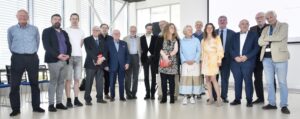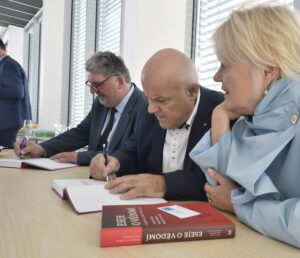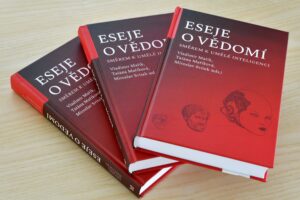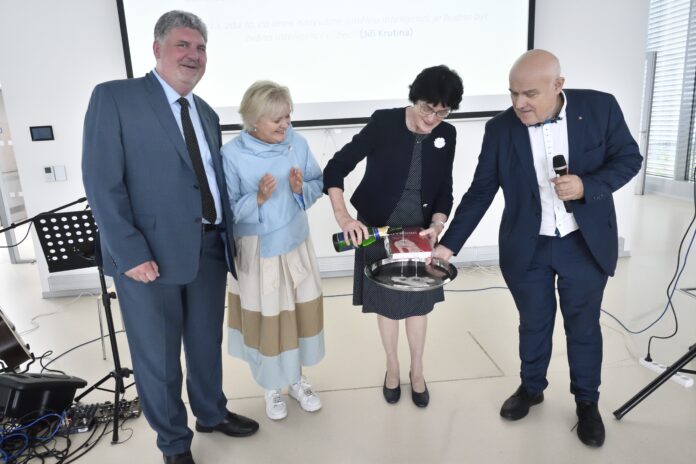Soubor Esejů o vědomí s podtitulem Směrem k umělé inteligenci editorů Vladimíra Maříka, Taťány Maříkové a Miroslava Svítka pokřtila na Českém institutu informatiky, robotiky a kybernetiky ČVUT předsedkyně Akademie věd ČR Eva Zažímalová. Kniha, která vyplňuje jistý dluh na českém knižním trhu, se snaží ukázat lidské vědomí pohledem pěti různých vědních oborů. Mezi autory jednotlivých esejů je řada významných osobností české vědy v čele s mikrobiologem Václavem Pačesem, neurochirurgem Vladimírem Benešem nebo nejcitovanějším českým vědcem Tomášem Mikolovem.
Co je to vědomí? Kniha nabízí pět různých pohledů – filozofický, náboženský či spirituální, ale také pohled biologie a lékařství, fyzikální a systémový pohled a na závěr pohled robotiky a umělé inteligence. Tento poslední směr a zároveň podtitul „Směrem k umělé inteligenci“ vysvětlují editoři kybernetik Vladimír Mařík, genetička Taťána Maříková a urbanista Miroslav Svítek již v úvodu knihy: „Byli jsme silně motivovaní jak obrovským zájmem veřejnosti o tuto oblast, tak i aktuálními potřebami umělé inteligence a robotiky, potřebami získat alespoň částečné odpovědi na důležité otázky pro rozvoj těchto moderních disciplín.“
Přestože má kniha tři sta padesát stran, hned ve svém úvodu přiznává, že definovat vědomí stále dobře neumíme a stále toho o něm víme velmi málo. Něco lze říci i negativním vymezením, tedy tím, co vědomím není, zmiňuje autor kapitoly Anatomie vědomí neurochirurg Vladimír Beneš. V úvodu se dále dozvídáme, že „vědomí je předmětem intenzivního výzkumu a zůstává přesto obestřeno řadou tajemství i pochybností, zdali je ho možno v současné době, při současném stavu poznání, současnými metodami plně poznat a objasnit“.

To vysvětluje zvolený širokospektrý přístup k tématu a snahu fenomén vědomí ohledat jak s pomocí exaktní vědy a měřitelných veličin, tak i z pohledu filozofického či náboženského. Kniha se nevyhýbá ani alternativním přístupům a spiritualismu. Přesto „medicínský pohled zůstává tím nejdůležitějším – a klíčovým objektivně doložitelným závěrem je to, že vědomí je především produktem činnosti mozku, i když se na něm podílí i další procesy a informační toky v některých jiných částech živého organismu“. Poslední kapitola se zaobírá možností vzniku umělého vědomí a vědomí strojů. Což je téma, které nedává spát mnohým. Dle autorů však můžeme být zatím klidní, neboť „ještě po mnohá desetiletí, ne-li století, Kurzweilova singularita, tedy nadvláda strojů nad člověkem, nenastane“.
Knihu slavnostně pokřtila Eva Zažímalová, předsedkyně Akademie věd ČR, události se zúčastnili nejen téměř všichni autoři, kterých je úctyhodných dvacet, ale také odborní recenzenti knihy, prof. Olga Štěpánková z CIIRC ČVUT a prof. Emil Pelikán z Akademie věd ČR.
Vydání knihy bylo iniciováno Institutem Equilibrium, z. ú. a podpořeno Českým institutem informatiky, robotiky a kybernetiky ČVUT, Centrem Karla Čapka pro studium hodnot ve vědě a technice a společností CertiCon, a. s. Vydalo nakladatelství Pavel Mervart.





